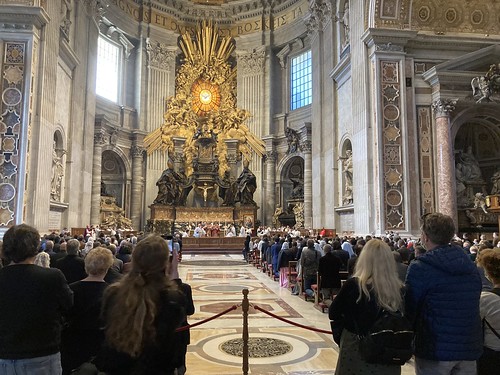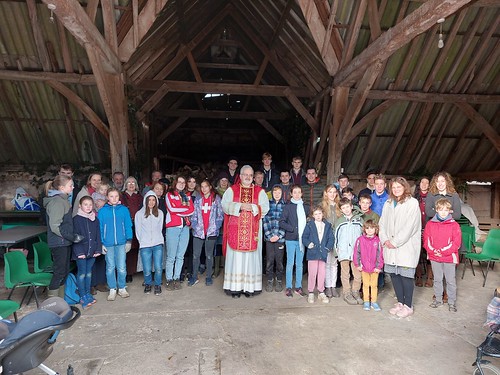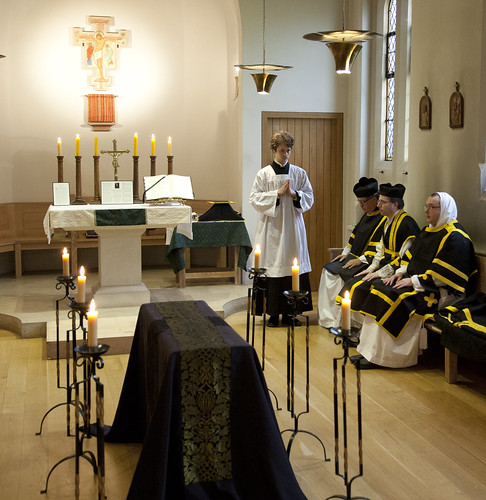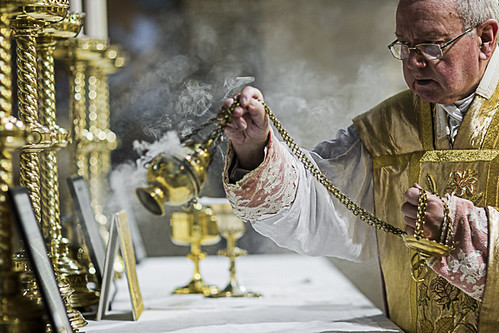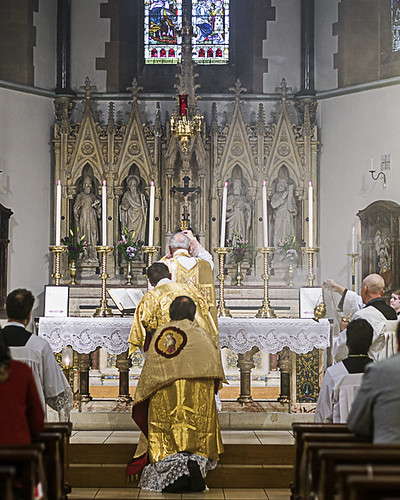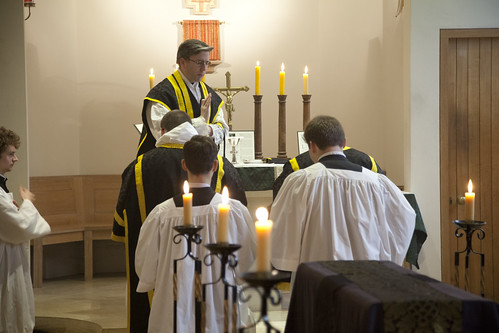 |
| The absolution before Communion: High Mass of Requiem at St Benet's Hall (Fr Edward van den Burgh) |
Labels
- Bishops
- Chant
- Children
- Clerical abuse
- Conservative critics of the EF
- Correctio Filialis
- FIUV Position Papers
- Fashion
- Freemasonry
- Historical and Liturgical Issues
- Islam
- Liberal critics of the EF
- Marriage & Divorce
- Masculinity
- New Age
- Patriarchy
- Pilgrimages
- Pope Francis
- Pro-Life
- Reform of the Reform
- Young people
Wednesday, December 29, 2021
Letter of the week: from The Tablet
Monday, December 27, 2021
Responsa ad dubia: good news on private Masses
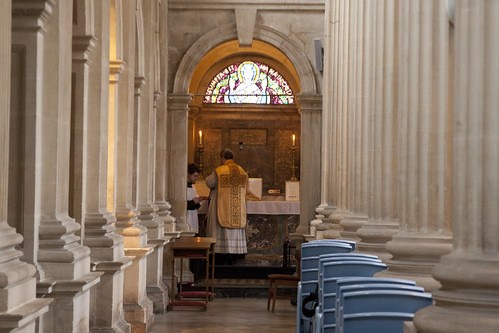 |
| A private Mass in a side-chapel, at Prior Park, England, at our Priest Training Conference in 2016 |
Friday, December 24, 2021
Thursday, December 23, 2021
Canonists cast doubt on the force of the Responsa ad dubia
 |
| LMS Pilgrimage to Chideock; High Mass was celebrated in the presence of Bishop Mark O'Tool of Plymouth, England. Photo by John Aron. |
My latest in the Catholic Herald. I'm grateful to them for publishing this so swiftly.
It is worth emphasising that the problem I discuss, essentially that the requirements on bishops in the Responsa infringe bishops' rights under Canon law, is not just some fever-dream of Traditional Catholics: it is being said by canonists all over the place. I am fortunate in having access to canonical advice from qualified people, which helped us in preparing our Canonical Notes on the Responsa, but you can see this online now, notably here, here, and here. Confronted with this difficulty by the journalist Edward Pentin, the Prefect of the Congregation for Divine Worship, Archbishop Roche, did not say anything which is likely to change anyone's mind. At this point we have to take the matter seriously.
My Catholic Herald article begins:
On Saturday 18th December a document was published by the Congregation for Divine Worship tightening up restrictions on the Traditional Latin Mass: Responsa ad dubia. This is a clarification of Pope Francis’ Motu Proprio Traditionis Custodes, answering questions (‘dubia’) sent to the Congregation by bishops.
Since then canonists all over the Catholic world have been examining the document, which appears to tighten the screws on the availability of the Traditional Mass considerably compared with Traditionis Custodes itself. By a stroke of the pen it prohibits marriages, baptisms, burials, and even blessings, using the older books, outside a tiny number of ‘personal parishes’. Similarly, it prevents priests from saying more than one Old Rite Mass on a Sunday, and allows them to say it on a weekday only if they have no Novus Ordo Masses to celebrate.
The ban on parishes noting the times of Traditional Masses on their bulletins has caused widespread ridicule. However, it suggests a level of attention to detail, and a desire to make the Traditionist phenomenon disappear from view, which is more than a little alarming. There is no reference to this, or to the other points just mentioned, in Traditionis Custodes, which now appears quite mild by comparison.
Responsa ad dubia: back to the future, forward to the past
 |
| The Holy Mile at Walsingham in 2018, in the rain. |
In the wake
of the Responsa ad dubia from the Congregation for Divine Worship, there
has been a fair amount of chatter on the internet about the uniquely bad situation
Catholics attached to the Traditional Mass and Sacraments now find themselves in.
As the canonists have got to work in interpreting the document, it turns out to
have less force than previously assumed by many—and the Latin Mass Society has
produced some notes to explain the situation in detail, which you can see here. Nevertheless, bishops have
the power to follow its lead.
This may mean, for example, that in a particular diocese the number of celebrations of the Traditional Mass is drastically reduced, or stopped: indeed, in some dioceses this has already happened. Further, in places where it had been straightforward to get married using the older books, to have one’s baby baptized using them, or have one’s deceased loved ones buried using them, this may become a headache, or simply impossible. Again, finding out if Masses are happening may become difficult, if they are no longer simply advertised on online parish bulletins.
This situation, insofar as it becomes a reality, will certainly be unjust and pastorally harmful. Contrary to certain febrile suggestions on Twitter and elsewhere, however, it does not mean the end of the Latin Mass Society, or the Una Voce Federation, or similar bodies around the world. Because if this situation were to arise, it might be new to some of the younger Traditional Catholics on social media, but it would not be new to the Traditional movement as a whole. It would simply take back to before 2007, or perhaps before 1988.
Difficult or
impossible to get a priest to celebrate a wedding or baptism according to the
old books?![]()
Closest Traditional Mass an hour or more's drive away? ![]()
Masses not
being publicly advertised, by order of the bishop? ![]()
Masses needing to be kept away from the ordinary, legitimate, worshippers?![]()
Arbitrary restrictions and conditions placed on Masses?![]()
Official
hostility expressed at every level of the Church? ![]()
Accusations
of disloyalty and schismatic leanings? ![]()
How did we survive the lean years before 2007? Well, it was tough. Many, many supporters of the Latin Mass Society were only able to get to the old Mass for occasional celebrations: an annual Mass here, a pilgrimage there, a Day of Recollection somewhere else, often a long journey from where they lived. Some, particularly those with difficulty travelling, could get to no Masses at all. Coach trips from London were frequently part of LMS events, for people who didn’t have cars and were starved of opportunities to get to, especially, sung Masses. I remember driving an hour and a half each way to attend a High Mass (with deacon and subdeacon), with a good choir, in Portsmouth Cathedral, in about 2003, because these kinds of Masses hardly ever happened. It was only with considerable difficulty that the Latin Mass Society established, in the early 2000s, an annual celebration of the Sacrament of Confirmation in London, and people came from all over England, Scotland, and even France and Belgium.
The Fraternity of St Peter, founded in 1988 with the good will of Pope John Paul II, found it extraordinarily hard-going in the early years, indeed up to 2007, as did the other traditional priestly institutes attached to the Traditional Mass. I well remember the heroic, and ultimately successful, efforts of priests of the FSSP and also of the Institute of Christ the King Sovereign Priest, to become established in England. Bishops were extremely reluctant to give them stable apostolates, with a place to live and a church to say Mass in.
And indeed things have continued to be difficult since 2007. Perhaps many Traditional Catholics in the pews do not realise quite how difficult things are for those, both priests and lay Una Voce activists, who try to organise Masses and other events, stabilise apostolates, and talk to bishops and the Curia. When Una Voce International did its world-wide survey of the Traditional Mass in 2020, we received many reports of whole countries where the bishops simply refused to talk to the local Una Voce group, and persecuted priests who wanted to celebrate the ancient Mass, and where, as a result, years of requests had yielded no celebrations at all.
It has never been easy. And now it is getting harder. We have been told that our annual Masses in Westminster Cathedral are now to be Sung, without deacon or subdeacon, as part of the implementation of Traditionis Custodes. I have no idea whether the “other sacraments” are going to be allowed, and in which dioceses, of England and Wales, let alone elsewhere. Perhaps Traditional Masses will have to take place in such a way that no-one not in the 'group' for which they are celebrated will ever stumble across them. I remember in the bad old days one priest's arbitrary rule was that there should be a two-hour gap between a Traditional Mass and a Novus Ordo one, so toxic and infectious were we deemed to be.
How are we going to cope? The Traditional movement and Una Voce groups in particular were built precisely to cope with this. We established close-knit groups for moral support and networks for exchanging information: and these still exist. The technology has developed (find our Telegram channel for Mass listings here), but the principle remains the same. In fact, in our organisations, in our ability to communicate, and in many other ways, we are stronger than ever.
The Latin Mass Society is the place, in England and Wales, where Catholics attached to the Traditional Mass can find information, support, and like-minded people. Our network of Local Representatives understand the conditions of each diocese and parish. We are in touch with priests and bishops, and through Una Voce International, with the Roman Curia.
All Latin Mass Society / Una Voce groups rely on supporters for funds and volunteers, and this is the moment, if you have not yet done so, if you are concerned about the Traditional Mass, to show your support by joining them: you can also become a 'Friend' of Una Voce International.
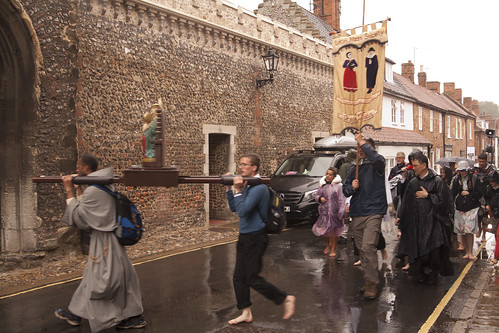 |
| Qui autem perseveraverit usque in finem, hic salvus erit. (Matt 24:13) |
Wednesday, December 22, 2021
LMS Canonical Notes on the Responsa ad dubia
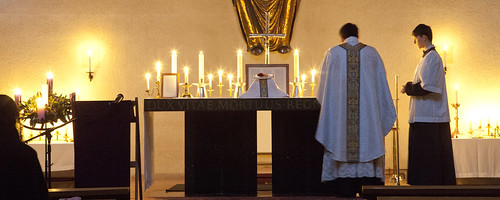 |
| Rorate Mass last Saturday, Holy Rood, Oxford |
Cross-posted from Rorate Caeli.
You can read the Latin Mass Society's discussion of the Congregation for Divine Worship's Responsa ad dubia, point by point, here.
Many canonists on the internet and off it have noticed that the Responsa issued by the CDW seem to be making demands on bishops and priests which go beyond the authority of a Roman Congregation to make. In some cases they seem to be taking away prerogatives from bishops which they are explicitly given by Canon Law, and even the Second Vatican Council. The Supreme Legislator, the Holy Father, can of course change Canon Law, but it would be ludicrous to suggest that the Congregation for Divine Worship can do so. Since the Holy Father has—presumably, deliberately—given the Responsa only generic, not ‘specific’, approval, it is the Congregation’s authority which is at issue.
Tuesday, December 21, 2021
Keep calm and find out where go to Traditional Mass
 |
| Rorate Mass at Holy Rood, Abingdon Road, Oxford, last Saturday (with a very slow shutter speed!) |
Monday, December 20, 2021
A small difficulty with the Responsa ad dubia
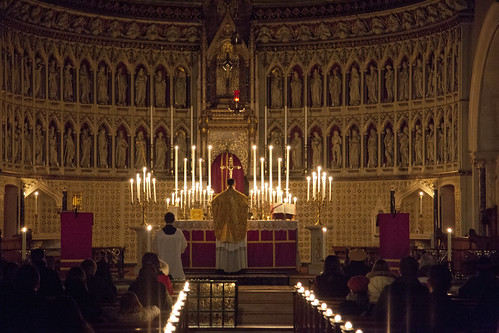 |
| Rorate Mass at the Oxford Oratory, England |
All the Church’s legislation needs to be understood in light of common sense, of previous legislation with greater authority, and of the Church’s the fundamental theological and moral principles. These principles of are of particular importance when we consider legislation which appears, on the one hand, to be hastily composed, and on the other, to have far-reaching, and perhaps unforeseen, consequences.
Tuesday, December 14, 2021
Tuesday, December 07, 2021
'Ministers of Christ' by Peter Kwasniewski
Friday, December 03, 2021
Pilgrimage to Lyford Grange

Thursday, December 02, 2021
Annual Requiem in St Benet's Hall

Wednesday, December 01, 2021
An anti-Christian cultural hegemony
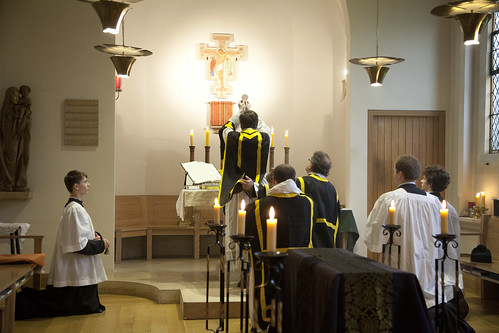 |
| Mass last Saturday: annual Requiem in St Benet's Hall, Oxford. |
Mantel, like the author Philip Pullman, seems to have “issues”, as the modern jargon has it, with Catholic faith and culture. She has no intrinsic significance — there have always been strange people around — what is important is the use which has been made of her: she has been awarded all kinds of prizes and her repulsive novels have been adapted for the Royal Shakespeare Company. Pullman, another winner of multiple awards, has had one book made into a film and another into a play. Both writers have received the accolade of special editions of their works done for the bibliophiles of the Folio Society.
The publicity machines have nevertheless found it difficult to explain these peculiar individuals. Mantel was initially praised for the historical accuracy and realism of her work but, as real historians began to notice her material, she hastily rebranded it as a very fictional kind of historical fiction. After pocketing prizes for children’s books, Pullman decided, as his graphic descriptions of child torture began to get a bit out of hand, that this was just a misunderstanding; no, he was writing for adults.
Such U-turns would have sunk lesser folk, but the secularist establishment needs Mantel and Pullman. They possess some literary skill and their work can be used to counter-balance and even to exclude the Christian narratives given to us by writers of a previous generation: notably, Robert Bolt’s play and film, A Man for All Seasons, about St Thomas More, and the children’s books of C.S. Lewis. Literature and historical memory is being remade in the snarling image of secular modernity.
Tuesday, November 30, 2021
Mass celebrated for Vladimir Ashkenazy
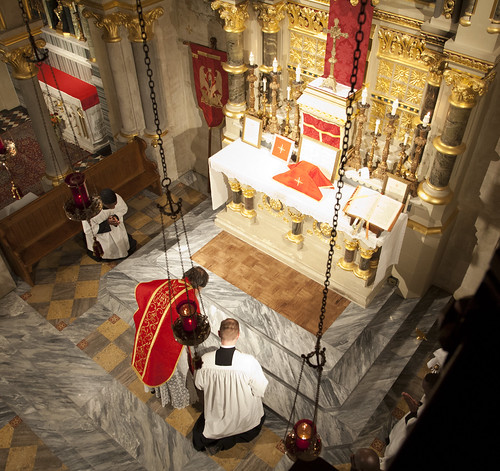
As well as presenting the distinguished conductor and pianist Vladimir Ashkenazy with the De Saventhem Medal, the Federation had a Mass celebrated for the good estate of his family through the Latin Mass Society, on the feast of St Cecelia, the Patron Saint of music. (More about this here.)
It was a Missa Canata, celebrated by Fr Gabriel Diaz Patri, and accompanied by polyphony sung by the Southwell Consort led by Dominic Bevan.
Saturday, November 27, 2021
Response to Fr Ruff on Liturgical Polarisation
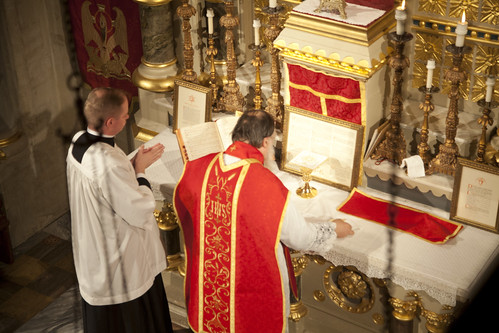 |
| Mass for Vladimir Ashkenazy and family at Maiden Lane last week. |
either one supports Vatican II and the reformed liturgy to the exclusion of the preconciliar liturgy, or one shows greater or lesser openness to the preconciliar liturgy, which seems to be equated with opposition to Vatican II.
He does not pause to explain what "opposition to Vatican II" might mean, but admits that not everyone falls into these two strictly opposed camps:
people who don’t fit neatly in either camp... [who] don’t see the preconciliar liturgy as particularly bad or harmful and don’t mind attending it at times.
Fr Ruff would like such people to realise
that the preconciliar liturgy is incompatible with the large advances made by the Second Vatican Council in ecclesiology and liturgical theology and inculturation and all the rest.
He gives the impression that he would like to see the Church become two armed camps snarling at each other from their trenches, with barbed wire, if not clouds of poison gas, marking out no-man’s land. But as for what these Vatican II "advances" might be, Fr Ruff does not say.
Sunday, November 21, 2021
Guild of St Clare: Sewing Retreat photos
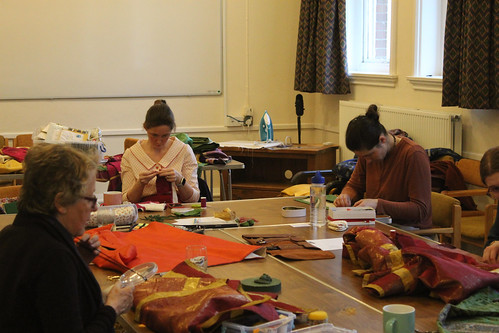
Last weekend was the Autumn Retreat of the Guild of St Clare. These are 'sewing retreats': with daily Mass and other devotions, and spiritual conferences from the retreat-giver each day, the participants mend vestments. This retreat took place in Douai Abbey.
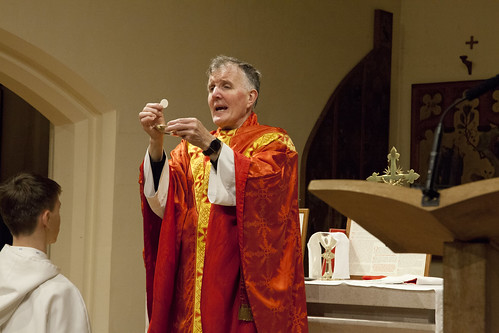
Saturday, November 20, 2021
LMS Bedford Pilgrimage in Reparation for Abortion
Friday, November 19, 2021
Letter in the Tablet: the value of the Old Mass
 |
| View from the choir loft at St Mary Moorfields, for the LMS' Easter Triduum 2018 |
I'm late with this, but I think it is worthy of a wider audience: part of a Letter in the Tablet from the 23rd October issue. All credit to them for publishing it.
Mr Wells' transformative liturgical experience sounds to me like one of the Masses organised in St Patrick's Soho Square and then in St Mary Moorfield's by Juventutem London before the lockdown, which were sponsored by the Latin Mass Society. (These continue, at the moment, in St Mary Magdalen, Wandsworth, in a slightly different format: 7pm on Fridays.) The organisers, including the then musical director Matthew Schellhorn of Cantus Magnus, should be reminded that their efforts were not without fruit.
On graduation I returned to my home parish where, for me, the post-conciliar vernacular Mass that had worked so well in the university chaplaincy seemed arid in a parish setting; perhaps the church building was too big for the new informality. Anyway, one evening I went to a Tridentine High Mass in central London, and what a difference: Gregorian chant drifting down from the gallery, the sacred ministers involved in the ritual of the Prayers at the Foot of the Altar, the gentle formalised approach of the whole service.
And that is what I crave when I go to Mass. I have no wish to split the Church or to denounce the present Pope. But I would like to worship God in the way that best leads me to him. Is that too much to ask?
IAN WELLS
NOTTINGHAM
Thursday, November 18, 2021
Do your Christmas shopping and support the Latin Mass Society
Just visit the easyfundraising site and all will be explained. The donations vary in size; some are fixed sums, some are percentages. It's not much but it adds up. If thousands of UK Catholics consistently did their shopping this way in favour of the Latin Mass Society or Aid to the Church in Need, it would raise a very real sum of money.
The Winter Mass of Ages has arrived!
In this issue:
Wednesday, November 17, 2021
Response to Cardinal Cupich
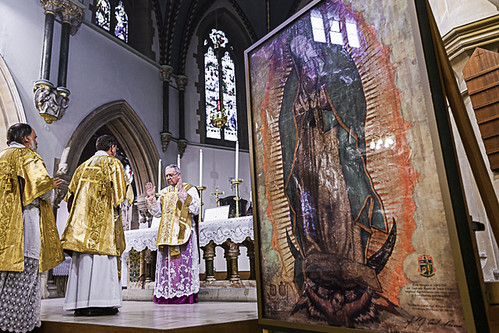 |
| LMS Pilgrimage to Bedford (in reparation for abortion), to the Shrine of Our Lady of Guadalupe |
Cardinal Cupich has published a defence of Traditionis Custodes in the Jesuit magazine America. (An earlier article, on Pray Tell, finds a response from Matthew Hazell on Rorate Caeli here.) In this article he argues... well it is actually quite unclear what he is arguing.
Is he suggesting the TC was a response to the failure of the SSPX to submit to the Holy See after Summorum Pontificum? In which case why are their privileges to give absolution and witness marriages in the old Rite not the target of the Holy See's restrictions, instead of the corresponding rights now denied to priests in good standing in the diocese of Rome?
Is he suggesting, instead, that the problem has been that people have been "promoting" the "antecedent liturgies"? But isn't that exactly what Pope Benedict XVI called for when saying that "it behooves us to ...to give them their proper place"?
Or is he arguing something quite different: that the very existence of an alternative form of the liturgy is a wound in the unity of the Church? In which case his complaint is less against the SSPX, or the Faithful who attend the Usus Antiquior under the bishops, but with Pope Benedict himself.
I have published a response in Catholic World Report. (America declined to let me respond.)
Cardinal Cupich begins the story with Archbishop Marcel Lefebvre, in “the early 1970s”. It is worth noting that by the time the SSPX became headline news, with its canonical suppression in 1975 and unauthorised ordinations in 1976, lay groups had been campaigning for the ancient Mass for more than a decade, and had achieved a symbolic, if limited, concession in Pope Paul VI’s Indult for England and Wales which was signed in November 1971, exactly fifty years ago. It was, similarly, the desire of the Faithful, not of SSPX clergy, which was recognised by Pope John Paul II’s world-wide indult of 1984, which does not mention the SSPX, and these Faithful who are again noted as a motivation for Pope Benedict’s Apostolic Letter Summorum Pontificum.
This is worth emphasizing because, although they share an attachment to the former Missal, the International Una Voce Federation (founded in 1965) and its member associations around the world, and the SSPX, are clearly distinct phenomena, and have suffered quite different fates in recent years. In 2016 Pope Francis gave priests of the SSPX special faculties to hear confessions, and in 2017 he made provision for them to officiate at marriage services. They still enjoy these privileges today. Priests serving the faithful within the structures of the Church, on the other hand, have just been forbidden to do either thing using the older books used by the SSPX in the very diocese of Rome. If Traditionis Custodes is motivated by disappointed hopes for “healing and unity” with the SSPX, it seems to have sadly mistaken its target.
Saturday, November 13, 2021
Iota Unum series continues: Dominic Sullivan, 19th November
Please come into the parish room via the stairs from Golden Square, rather than through the church. So the address is that the of the Presbytery: 24 Golden Square, London W1F 9JR
This month Dominic Sullivan, Head of Classics at the London Oratory School, is giving a talk entitled 'Spanish Intergrism and the Lesser Evil'.
Thursday, November 11, 2021
Remembering the Agatha Christie Petition
 |
| High Mass in the Chapel of the Throne, St Peters, for the Summorum Pontificum Pilgrimage 2021. The celebrant was Mgr Patrick Descourtieux. Photo by Edward Pentin |
My latest in the Voice of the Family bulletin. Here I address the objection that the beauty of the liturgy and the music and so on are irrelevant to the real value of the liturgy.
------------------------
Almost exactly fifty years ago, 5th November 1971, the reformer of the Catholic liturgy, Archbishop Annibale Bugnini, wrote to John Cardinal Heenan, informing him of the terms of an “indult”, permission, for the continued public celebration of the older Catholic liturgy, the Traditional Latin Mass, with the agreement of the local bishop. The reformed Mass had been in place for less than a year, and Catholics had been warned that the older Missal would become illicit at the end of the calendar year, except for private celebrations by older priests. Although the indult was applicable only to England and Wales, Bugnini was denied the complete victory of the reform he had wanted to see. In 1984 another indult for the Old Mass was signed, by Pope John Paul II, which extended permission for the Vetus Ordo to the whole world.
Paul VI believed that the reformed Mass was theologically accurate and rich, and he had high hopes that it would be pastorally effective. One argument which retained the power to move him was historical and cultural. Pope Paul had indeed indicated that he understood such arguments, speaking of the “expressive sacrality” of Latin and the “regret” which faithful Catholics might feel in the change. Heenan, who had attended the canonisation of the Forty Martyrs just days before his meeting with the Pope – forty men and women who had literally died for the Mass – was able to show Pope Paul a petition showing an astounding number of figures of the highest culture begging him to preserve something which, as the petition text expressed it, “belongs to universal culture”.
Tuesday, November 09, 2021
Vicar General of Rome attempts to ban the use of the 1962 Rituale Romanum
The motu proprio establishes that the “liturgical books promulgated by the Holy Pontiffs Paul VI and John Paul II, in conformity with the decrees of the Second Vatican Council, are the sole expression of the lex orandi of the Roman Rite” (art. 1, Traditionis Custodes) and that therefore it is no longer possible to use the Roman Ritual and the other liturgical books of the “ancient rite” for the celebration of sacraments and sacramentals (e.g., the Ritual for the reconciliation of penitents according to the ancient form). The use of the other Ordines, therefore, is currently expressly forbidden and only the use of the Missale Romanum of 1962 remains permitted.
The liturgical books promulgated by Saint Paul VI and Saint John Paul II, in conformity with the decrees of Vatican Council II, are the only expression of the lex orandi of the Roman Rite.
Monday, November 08, 2021
Vladimir Ashkenazy accepts the De Saventhem Medal from the FIUV
 |
| Vladimir Ashkenazy in 2007, from Wikipedia Commons |
 |
| 'Dr Erich de Saventhem: Pro merito magno' |
My personal view of the matter is, that it is of great spiritual value and importance that the more ancient Latin Catholic Liturgy, with its associated cultural and musical traditions, be preserved for all those who are concerned with strengthening, or at least maintaining, our connection with the Divine; the ancient liturgies, be they Catholic or Orthodox (I am baptized in the Russian Orthodox Church) are, by default, bound to represent a much purer spiritual relationship with Christ in particular, and with the world in general, than do, to quote Dr. Erich Vermehren De Saventhem: " the flat, prosaic, philistine or delirious liturgies which will soon overgrow and finally smother even the recently revised rites..."
Being a musician, I am fully in agreement with the idea that the ancient/traditional Roman Catholic Mass will have inspired a plethora of invaluable artistic achievements over the ages: mystical works, poetry, philosophical treatises, musical works of genius, magnificent edifices, wonderful paintings, incredible sculptures, and even the construction of marvellous musical instruments like the organ and the piano!
There is a discussion of the significance of the petition and of the involvement of Agatha Christie on the Catholic National Register, and of cultural figures including Vladimir Ashkenazy on the 1P5 blog respectively.
More about the 1971 petition, its organiser Alfred Marnau, and other petitions for the same cause, can be seen here.
Saturday, November 06, 2021
A response to the Letters between Westminster and the CDW
Letters between the Cardinal Archbishop of Westminster, England, Vincent Nichols, and the Prefect of the Congregation for Divine Worship, Archbishop Arthur Roche, have been made public, first on Gloria TV and then on the 1P5 blog.
Once this things are leaked there is no putting the genie back in the bottle. You can read there there.
I was fortunate to be able to compose a reponse to these letters in advance of their publication, which is included in the 1P5 post. For the record, here it is in full.
---------------------
Commentary
on the Exchange of Letters between Cardinal Nichols and the Prefect of the CDW
Joseph Shaw
These two letters have been going around by email for some time, and it was inevitable that they would be published. They have been offered to 1P5 and since they are now going to be seen by everyone I can comment on them publicly. Some of the contents are a little technical and obscure, but none of it should surprise us, the basic message is positive, and it also gives us a chance to respond to arguments currently being developed to limit what we can do.
In his letter, Cardinal Nichols asks for clarification on a series of detailed issues from the Curial institution which now has authority in the area, the Congregation for Divine Worship (CDW). Archbishop Roche, the English Prefect of the CDW, replies, sometimes in a slightly vague way, since these are early days in the interpretation of Traditionis Custodes. Some things are not settled; others are not to be settled at all, but left to bishops’ discretion.
The most
interesting questions are these.
Thursday, November 04, 2021
Traditions, Liberation, and Meaning
 |
| St Teresa of Avila said she would be prepared to die for "the least of the ceremonies of the Church". This is the "minor elevation": Corpus Christi, Maiden Lane. |
I wish to place a recent development in the Catholic Church into the context of the wider cultural and political debate. The development is the publication, on 16th July, of a document called Traditionis Custodes, and an accompanying Letter to Bishops, by Pope Francis. These documents seek to restrict, and ultimately abolish, the celebration of the Church’s older form of liturgy.
This may look like an obscure internal dispute, but the Catholic Church, today and in terms her place in history, is large enough to be the arena for an important conflict. For the Church is not simply old: in a certain way it preserves the past. It is a feature of the Catholic worldview to take seriously, within certain limitations, her own past practices and to regard them as action-guiding, normative, for the present and the future. This has long been ridiculed by the Church’s opponents as a matter of doing the same thing as has always been done simply for the sake of it, even when the reasons for the original practice are no longer applicable or have been forgotten. Both the practice of treating tradition as normative, and the criticism of this as obscurantism, are very clearly on display in the history of the Catholic liturgy, though the Church’s legal system, theology, and many other aspects of her governance and culture could also provide examples.
To give an example, there is a tradition in the Catholic liturgy that the priest, when saying the holiest prayers of the Mass, the Canon, inaudibly at the Altar, breaks the silence to say aloud a single phrase of the text he is reading: “nobis quoque peccatoribus” (“to us sinners, also”). In his 1949 The Mass of the Roman Rite, we are informed by the great liturgical historian Fr. Josef Jungmann SJ, who was also an advocate of reform, that in some century distant from our own this custom was established as a signal for some other liturgical functionaries to do something. Developments since that time have been such, however, that this signal is no longer necessary.
Jungmann’s proposal is in itself perfectly plausible. The question is whether it debunks the meaning of this custom as understood by the worshippers of later generations. Thus, St. Albert the Great points out that the priest’s raising of his voice serves to draw attention to his act of confession: a confession of unworthiness, on the part of the clergy, which is frequently underlined in this liturgical tradition.
Wednesday, November 03, 2021
Halloween and the month of Holy Souls
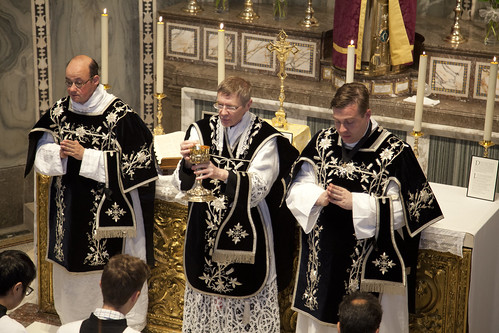 |
| Requiem for Fr Anthony Conlon at Our Lady of the Assumption Warwick Street |
In his book, The Reform of the Liturgy 1948-1975, the architect of the reform that took place after the Second Vatican Council, Annibale Bugnini, expressed his regret that he could not move Ash Wednesday onto a Sunday. A penitential Sunday is impossible, he explains, but as things stand, Ash Wednesday is forever associated with Mardi Gras.
In countries and regions where Mardi Gras is a big thing, one can appreciate the problem, especially when celebrations spread over Ash Wednesday itself. And yet, like the consumerism of Christmas present-giving and the chocolate eggs of Easter, it is ultimately a product of Catholic liturgy. As Catholics, we have to work out how to handle this overgrown and frankly deformed progeny of our own tradition.
We have a similar problem with Halloween.
Tuesday, November 02, 2021
Summorum Pontificum Pilgrimage to Rome 2021
